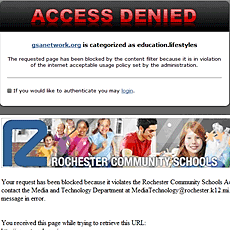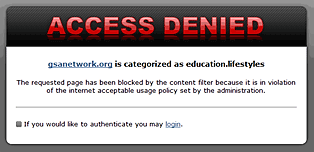
A centerpiece of the ACLU's work for lesbian, gay, bisexual & transgender (LGBT) youth is ensuring that public schools don't erase LGBT people from the school environment. Opponents of LGBT equality, or school officials who are simply uncomfortable with LGBT issues, often try to make LGBT people and issues about our lives invisible in school. They tell kids they can't be open and honest about who they are, they fail to mention that historic, literary or political figures were gay, and they prevent discussion of LGBT-related topics both in and out of the classroom.
With new technology comes new ways to censor, and in 2009 we learned that two Tennessee school districts were using web filtering software to prevent students from learning about LGBT information on the Internet. The districts blocked access to pro-gay websites, like the website for GLSEN, the Gay, Lesbian and Straight Education Network, which provides students with information and resources about forming Gay-Straight Alliance student clubs. At the same time, the districts allowed students access to anti-gay websites, such as pray-away-the-gay “reparative therapy” sites, on the very same school computers. This is viewpoint discrimination by the government, and violates the First Amendment. These websites aren't about sex (there's an entirely separate web filter category for those sites), they provide crucial information and support to students. The student who brought the Tennessee situation to our attention, for example, was blocked from websites about college scholarships for LGBT students.

Access through the Internet to information about the broader LGBT world is important to LGBT youth all across the country. Many students don't have Internet access at home, and the only place they can get online is at their school or public library. For other students, using a home computer to learn about LGBT-related resources is just too risky. Given the prevalence of anti-gay harassment and violence in our schools, ensuring that kids can learn that they are not alone is critical. Schools shouldn't shut the Internet's portal to the wider LGBT world, and it's certainly crazy for schools to close off access only to pro-gay information while allowing students to see the anti-gay stuff.
So we sued the two Tennessee districts, got them to remove the filters, publicized the issue, and hoped that schools officials elsewhere would wise up and fix the problem on their own.
But two years later, we're still getting a steady and stubborn stream of complaints about web filtering in public schools across the country. So this past February we launched "Don't Filter Me!," a campaign to find and eliminate the blocking of pro-LGBT websites across the country. We put together a short video aimed at students; publicized the effort through student-focused media, websites, and partner organizations; and joined forces with students in a Yale Law School clinic, who are helping us investigate the complaints and advocate with offending districts.
The response has been amazing. We've gotten reports of web filtering from all over the country (even from a high school at a U.S. military base in Japan), and today we've sent letters to high schools in Missouri and Michigan demanding that they stop censoring pro-LGBT websites. A public high school in Rochester, Michigan, for example, blocks access to LGBT student resource websites www.gsanetwork.org and www.dayofsilence.org, but allows students to view sites for Parents and Friends of Ex-Gays and People Can Change. We're also sending requests for information about web filtering programs to school districts in Alabama, Arkansas, California, Nevada, New Jersey, Pennsylvania, South Carolina, Texas, Wisconsin, and Washington.
Support for the Don't Filter Me! campaign (and the rest of the ACLU's schools work) has recently come from an important source — columnist and LGBT advocate Dan Savage. Dan's It Gets Better Project has selected the ACLU's LGBT Project as a partner in its efforts to protect LGBT youth in schools. Dan's explanation of the It Gets Better Project's support for its three partner organizations is simple: "[The] Trevor [Project] is there for kids in crisis. GLSEN is there making junior and high school environments more accepting so there are fewer kids in crisis. And the ACLU is really there for queer kids who are being discriminated against by administrators in schools. ACLU is there to kick some ass." Yup, that's just what we'll do.
Learn more about LGBT rights: Subscribe to our newsletter, follow us on Twitter, and like us on Facebook.

